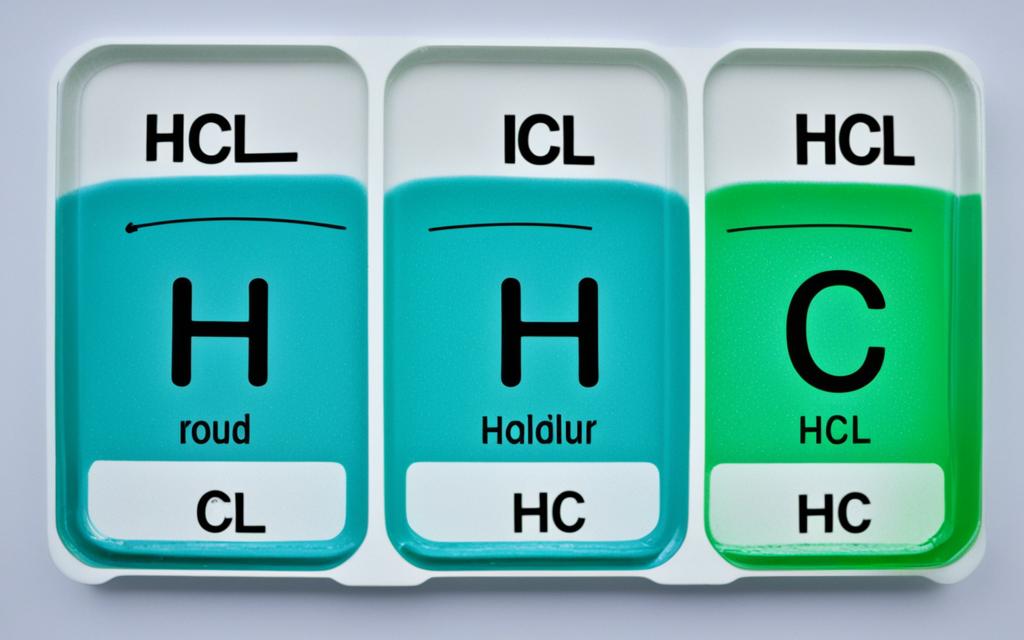Hydrochloric acid (HCl) is a widely used chemical compound with significant applications in various industries. Understanding the acidic nature of HCl is crucial as it plays a vital role in many chemical processes and reactions. In this article, we will explore the chemical properties of HCl, its acidic characteristics, and its practical applications.
What is HCl?
HCl, or hydrochloric acid, is a chemical compound consisting of hydrogen (H) and chlorine (Cl) atoms. The chemical formula for HCl is HCl, which represents one hydrogen atom bonded to one chlorine atom. HCl is a colorless, pungent-smelling gas that is highly soluble in water, forming a strong acidic solution.
Hydrochloric acid is a widely used chemical compound with a variety of applications across industries. Understanding the properties and characteristics of HCl is crucial, as it plays a pivotal role in numerous chemical processes and reactions. In this section, we will delve deeper into the nature of HCl and explore its unique features.
| Property | Description |
|---|---|
| Chemical Formula | HCl |
| Appearance | Colorless, pungent-smelling gas |
| Solubility | Highly soluble in water |
| Acidity | Strong acid |
| Applications | Wide range of industrial and household uses |
By understanding the fundamental properties of HCl, you can better appreciate its role in various chemical reactions and its practical applications in diverse industries and sectors. As we proceed, we’ll explore the acidic nature of HCl and how it contributes to its unique characteristics and versatility.
Acidic Nature of HCl
Hydrochloric acid (HCl) is considered a strong acid due to its high degree of dissociation in water, resulting in a high concentration of hydrogen ions (H+). When HCl is dissolved in water, it undergoes ionization and produces a large number of H+ ions, lowering the pH of the solution. This high concentration of hydrogen ions is the primary reason for the acidic nature of HCl, making it a potent proton donor in various chemical reactions.
The acidic character of HCl stems from its ability to release hydrogen ions when it comes into contact with water. The chemical equation for the dissociation of HCl in water is:
HCl + H₂O → H₃O⁺ + Cl⁻
This reaction demonstrates how HCl donates a hydrogen ion (H+) to the water molecule, forming a hydronium ion (H₃O⁺) and a chloride ion (Cl⁻). The presence of these excess H₃O⁺ ions in the solution is what gives HCl its characteristic acidic properties.
The strong acidic nature of HCl is crucial in various industrial and scientific applications, where its ability to donate protons is exploited for specific purposes. Understanding the acidic nature of HCl is essential for comprehending its role and behavior in numerous chemical processes and reactions.
Is HCl Acidic or Basic?
Based on its chemical properties, HCl (hydrochloric acid) is considered an acidic compound. The presence of hydrogen ions (H+) in aqueous solutions of HCl gives it an acidic character. Acids are substances that release hydrogen ions when dissolved in water, whereas basic compounds (or bases) accept hydrogen ions. Therefore, HCl is classified as an acidic substance due to its ability to donate hydrogen ions in chemical reactions.
To better understand the acidic nature of HCl, let’s take a closer look at its chemical behavior:
| Property | Explanation |
|---|---|
| Dissociation in Water | When HCl is dissolved in water, it readily dissociates, releasing a high concentration of hydrogen ions (H+) into the solution. |
| pH and Acidity | The abundance of H+ ions in an HCl solution results in a low pH, typically around 0-1, making it a strong acid. |
| Proton Donating Ability | HCl’s ability to donate protons (H+) to other substances in chemical reactions is the primary reason for its acidic nature. |
In conclusion, the evidence clearly demonstrates that HCl is an acidic compound due to its propensity to release hydrogen ions and donate protons in aqueous solutions. This acidic character is a fundamental property of hydrochloric acid and is essential in understanding its various applications and reactions in the field of chemistry.
Applications and Uses of HCl
Hydrochloric acid (HCl) is a remarkably versatile chemical compound with a wide range of practical applications across various industries. From the production of essential chemicals to water treatment and household cleaning, HCl’s unique acidic properties make it an indispensable tool in many sectors.
One of the primary industrial uses of HCl is in the manufacturing of various chemicals. It plays a crucial role in the synthesis of many organic and inorganic compounds, serving as a key ingredient or a processing aid. Additionally, HCl finds extensive application in metal processing, where it is used for pickling, etching, and descaling operations, helping to prepare surfaces for further treatment or coatings.
In the realm of water treatment, HCl is widely employed to regulate the pH levels of water, ensuring optimal conditions for efficient water purification and disinfection processes. Its acidic nature also makes it valuable in the pharmaceutical industry, where it is used in the production of certain medications and healthcare products.
Interestingly, HCl’s usefulness extends beyond industrial settings. In households and commercial establishments, HCl-based cleaning products and descaling agents are commonly used to tackle tough stains, mineral buildup, and various cleaning challenges. Furthermore, the acidic properties of HCl are leveraged in the production of specific foods and beverages, where it plays a crucial role in maintaining the desired flavor profiles and acidity levels.










